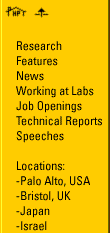| |
HP Labs Technical Reports
Click here for full text:

Geometric Logic, Causality and Event Structures
Gunawardena, Jeremy
HPL-91-119
Keyword(s):
Abstract: The conventional approach to causality is based on partial orders. Without additional structure, partial orders are only capable of expressing AND causality. In this paper we investigate a syntactic, or logical, approach to causality which allows other causal relationships, such as OR causality, to be expressed with equal facility. In earlier work we showed the benifits of the approach by giving a causal characterisation, in the finite case, of Milner's notion of confluence in CCS. This provides the justification for the more systematic study of causality, without finiteness restrictions, which appears here. We identify three general principles which a logic causality should satisfy. these principles summarize some basic intuitions about events and causality. They lead us to geometric logic - the "logic of finite observations" - as a candidate for a logic of causality. We introduce the formalism of geometric automata based on this choice; a geometric automaton is a set E together with a pair of endomorphisms of the free frame (locale) generated by E. Our main result is to show that Winskel's general event structures are a special case of geometric automata.
Back to Index
|




